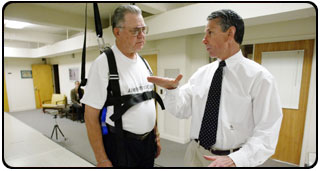Wake Forest researcher studies effectiveness of popular joint pain medicine

Steve Messier, right, works with a GATES participant in the J.B. Snow Biomechanics Lab.
Doctors recommend them to their patients, health stores hype their benefits to ailing baby boomers and they have become a multi-million dollar industry — but no one knows for sure if glucosamine and chondroitin supplements actually work to ease aching joints, says a Wake Forest University expert on biomechanics and osteoarthritis.
“There is enough evidence to suggest that something positive is going on with these supplements,” says Steve Messier, professor of health and exercise science and director of the J.B. Snow Biomechanics Lab at Wake Forest. “But, there has been no controlled study that shows definitively that these supplements improve pain and function in older adults with knee osteoarthritis.”
Messier hopes to change that with GATES (Glucosamine/chondroitin And Training Exercise Study), a new study for which he is the lead researcher. The study, funded by Nutricia (General Nutrition Centers) and conducted on Wake Forest’s Reynolda Campus, will analyze the effects of glucosamine and chondroitin paired with exercise in the treatment of osteoarthritis of the knee.
Glucosamine, a form of amino sugar that promotes cartilage formation and repair, and chondroitin, part of a protein molecule that gives cartilage elasticity, have gained recent popularity through products like Flex-A-Min and others that claim the supplements help replace and restore cartilage. Cartilage is broken down and eventually disappears in a person with osteoarthritis, says Messier. The absence of that cushion exposes the underlying bone that forms the knee’s joint and is the cause of most patients’ pain.
Messier and his colleagues have already shown that exercise improves mobility in people with osteoarthritis in a study published in The Journal of the American Medical Association. Now, he hopes to prove that exercise in combination with glucosamine and chondroitin will produce even better results for those patients. Messier says GATES is the first study to examine the relationship between the supplements and exercise.
“From a public health perspective, we want to find ways to make life better for people with this condition,” says Messier. “This study will give us a clear idea of whether we’re going down the right path with this treatment combination.”
In the year-long GATES study, patients will be divided into two main groups: one taking glucosamine/chondroitin supplements and one taking placebo pills. After six months — enough time for the supplements to take effect — researchers will survey the patients using a variety of testing methods to determine the effect of the pills alone. Then, both groups will begin a six-month exercise program that includes walking and light weight training. Each group will continue taking either the supplements or the placebos during the exercise phase. They will be tested again at the end of six months.
The study is recruiting participants in the Piedmont Triad who are age 60 or older, who do not exercise for more than 20 minutes per week and who have osteoarthritis of the knee, or painful knees. Participation is free and limited transportation is available. Anyone interested in participating in the study should call 336-758-3247.
Categories: Research & Discovery, University Announcements
Media Contact
Wake Forest News
media@wfu.edu
336.758.5237



